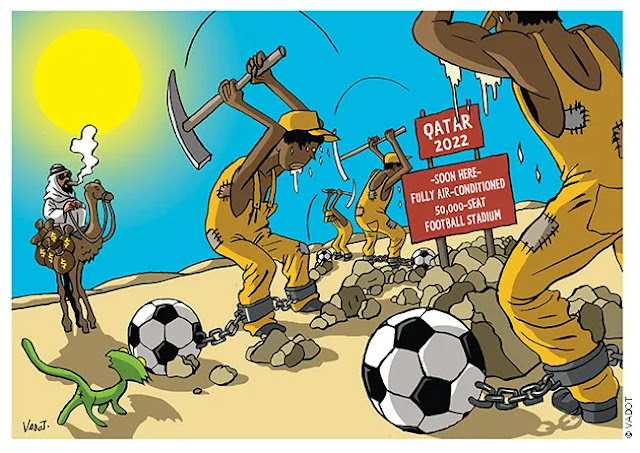Less than three weeks to go before the Qatar World Cup kicks off. Krishna Timislina worked for several years at construction sites for the stadiums the conditions were “hell on earth”. Sometimes 18 hour working days in searing heat and powered by energy drinks), water of dubious quality, prefab housing without space or privacy, and people dying from accidents or exhaustion.
He told French journalists Sébastian Castelier and Quentin Muller for their book “Les Esclaves de l’Homme Pétrole” (“The Oil Man’s Slaves”) that with “precarious living conditions, terrible water quality and interminable shifts, we know our health is being damaged – but do we have a choice?" He explained, “So much of Qatar is being built thanks to our work – stadiums, shopping malls, bridges and roads are being constructed – but we’re not invited to share in the dream.”
Qatar has used a massive influx of foreign workers to build the infrastructure for the footballing extravaganza – with migrants building roads, a new airport, a railway network and seven new stadiums. However, the human cost has been dreadful.
In a report published in August 2022, Amnesty International said that more than 15,021 foreigners of all ages and occupations had died in Qatar between 2010 and 2019. A February 2021 investigation found that at least 6,751 migrant workers died in Qatar from 2010 to 2020. But Castelier noted the real number is likely much higher. “These figures mainly come from Asian embassies in Qatar; we don’t have the statistics for African workers there.” That figure also does not take into account workers who die after returning home. They point out that many such untimely deaths are due to kidney problems following the consumption of unsafe water. An Amnesty International investigation found that at least 6,751 migrant workers died in Qatar from 2010 to 2020 from drinking homemade alcohol and energy drinks as they struggle to keep up with the frantic work pace.
Qatar’s climate has a lot to do with the high mortality rate. “It’s very hot in the summer,” Castelier said. “It’s just hell working in the construction industry. Qatar has banned working outdoors in the open from 10:30am to 3pm, but many violations have been reported.”
Lack of training can be another cause of death. “They put people who haven’t been trained on huge machines or on scaffolding, and they often have no idea about safety measures – so there are plenty of accidents,” Castelier said. Qatar knows all this makes for bad PR: “It’s perfectly aware that the stories about migrants workers are a problem; they’re constantly trying to put forward a narrative that they’re a modernising country.”
Qatar hosts nearly 400,000 migrant workers, often in conditions of modern-day slavery.
“It’s like a disposable workforce,” Castelier said. “That’s how migration to the Gulf states works. It’s impossible for an immigrant to obtain local citizenship. So when they’re no longer working, they have to leave." Migrants arriving in Gulf states soon fall prey to an exploitative system, with “kafala” at the heart of it. In a widely used system in the Gulf, a sponsor (or “kafeel”) is assigned to each migrant, often his or her employer. The system puts migrants at the mercy of their employers, who often confiscate their passports upon arrival.
The kafala system “gives the employer a lot of power over the employee”, Castelier said. “Everything is OK if the employer respects the rules. But if not, the employee’s life can become a living hell.”
In a public relations attempt to improve its image, Qatar officially abolished the kafala system in 2016. Yet in reality, “many aspects of it are still in force”, Castelier said. “Most notably, an employer can say that a migrant working for them is a fugitive. So if a domestic worker, for example, wants to denounce abuses by their employer, the latter can easily say that they have absconded – and instead of looking into the worker’s complaints, the police will just return them to their employer.”
‘Just hell’: New book shines light on migrant deaths ahead of Qatar World Cup (france24.com)


No comments:
Post a Comment